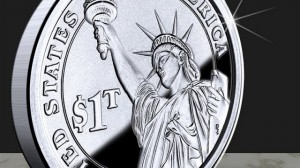Last week, the entire nation avoided the biggest metals scam in history when the Treasury Department announced that it would not mint a trillion-dollar platinum coin to reduce the government’s debt. The platinum price has been rising, and is expected to perform better than gold this year, but there still isn’t enough of the stuff above ground to mint a coin that is actually worth $1 trillion. If the Federal Reserve had accepted such a coin as payment, it would surely have been the greatest swindle in the history of modern economics.
Actually, on second thought, it wouldn’t have been much of a swindle at all. Printing a trillion-dollar coin would have simply been a more honest approach to what the government and the Fed have been doing for years: printing money that doesn’t exist and has no real value underlying it. Instead of minting coins or bills in outrageous denominations, the Fed simply “buys” government debt by typing a big number into a computer and – voila! Suddenly the Treasury has an extra $85 billion dollars to spend every month. Where did the money come from? The magic push of a button by some bureaucrat at the Fed.
The main difference between a trillion-dollar coin minted by the Treasury and the Fed’s “quantitative easing” is that everyone understands the Treasury’s coin isn’t worth its face value, unlike the government bonds that are exchanged for Fed stimulus. Say what you want about Ben Bernanke, but you’d hope he’s smart enough to prevent the Fed from falling for the same scam he’s been managing for years.
The concept of minting a coin with a bogus value in a time of crisis is reminiscent of the 1930s. When banks were low on funds during the Depression, they would sometimes distribute wooden nickels with expiration dates, which allowed people to do business until the bank got more currency and the wooden coins could be exchanged for legitimate cash. The idea worked in theory unless you forgot – or were unable – to cash in the nickel before the due date. Hence the adage, “Don’t take any wooden nickels.”
We’re lucky we don’t have to worry about commercial banks trying to pawn off wood or platinum coins of trillion-dollar, or even million-dollar, denominations. But still, the whole concept makes you wonder, what is our cash actually worth? The average bank executive hasn’t the chutzpah of Washington criminals, but your bank’s cash is issued from the same place as mine.
Tim Geithner is now on his way out, with Jack Lew replacing him as Secretary of the Treasury. Who knows, maybe Tim will place a special order at the mint and take a little “souvenir” with him. Probably not, but small-time scammers might get some ideas from the master criminals in Washington, so I’m keeping a lookout for anyone trying to hock overvalued coins.
Just remember: never accept any platinum coins as payment for anything more than the value of the platinum itself. Unlike the Fed, your money supply is limited.
—
For a smart appraisal of the trillion-dollar coin scheme, check out Jim Grant’s interview on CNBC:


